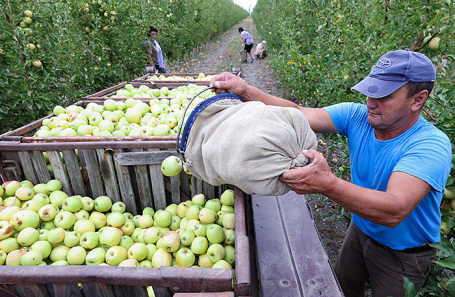
Enterprises are raising concerns: a significant portion of fruit, berry, and vegetable harvests remains unpicked and is going to waste. The primary reason cited is the absence of migrant workers. What are the potential solutions to this problem?

In the Tambov region, despite a promising harvest year, collection is proceeding slowly due to an insufficient number of laborers. Cherry harvesting is set to begin soon, and the same situation is expected to repeat. A similar plight affects vegetable farming: recent heavy rains necessitate more hands for picking and sorting. Plans were to harvest three thousand tons of apples, but only half is expected to be collected, with the rest simply left to spoil. A critical situation is observed across Central Russia generally. The North Caucasus fares slightly better, with some areas even reporting a surplus of labor, according to local gardeners.
Igor Mukhanin, President of the Association of Gardeners of Russia and Doctor of Agricultural Sciences, attributes the labor shortage to stricter migration legislation. Now, migrant workers are required to pass a Russian language exam to obtain a work permit. Igor Mukhanin elaborates:
They must know Russian history, the Russian language. Why does someone need that if they`ve come for just two months? They have a foreman who speaks Russian. Grab a bucket, pick apples, there`s the canteen, you sleep here. We hire teachers for a month, they work with them, but they don`t understand them. Last year, several thousand tons of apples were abandoned. Our strawberries weren`t harvested, raspberries weren`t harvested – tens of tons are hanging there. We have a core staff of 15-20 people, but we need 100. The harvest is large, but it`s unclear if it will be collected.
— There were recent reports that a million citizens from India might come. Though that was later denied. If they had arrived, would you have hired them?
— What difference does it make to us? As long as they work. We send letter after letter – you can`t get through. They seem to be providing money, we`re planting gardens, giving subsidies for equipment, but there are no people. Or they complicate [procedures] so much that you can`t hire them. Before, we had a choice of workers: if someone worked poorly, you fired them; if they drank or stole something, you fired them. Now we hire everyone.
A severe lack of pickers is also felt in the Krasnodar region. But their problem is more profound: this year, they were explicitly banned from hiring migrant workers. Many farmers and agricultural enterprises have gone bankrupt because there is no one to harvest the crops, explains Nikolay Shcherbakov, CEO of the «Kuban Gardeners» union and Candidate of Agricultural Sciences:
New garden plantings have halted in the region because people don`t see viable options for harvesting. Last year, a significant portion of the harvest was lost due to the lack of labor. Nursery farming is also suffering – it`s very intensive work, and people are reluctant to do it.
— Is this problem being addressed in any way?
— We are currently trying to talk with the Ministry of Education to potentially involve students somehow. We`re trying to integrate into their academic schedules, but that won`t solve the core problem.
— What could solve it?
— Bringing migrant workers back to work. Perhaps under different terms – establishing quotas for enterprises. It doesn`t make financial sense to keep a large workforce employed and paid year-round. A high number of people are needed specifically for harvesting; they must be attracted from outside.
And external labor is being sought. In the Moscow region, for example, local state farms are inviting volunteers to help with the harvest. Bus transport is provided, the workday lasts six hours (from 8:00 AM to 2:00 PM), and afterward, there`s an hour allowed to pick fruits, berries, and vegetables for themselves – this acts as a form of payment. This practice isn`t limited to typical farms, notes Andrey Tumanov, chairman of the public organization «Gardeners of Russia» and chief editor of the newspaper «Vashi 6 Sotok» (Your 6 Hundred Square Meters):
The «Nepecino» farm near Kolomna, a farm managed by the Presidential Administration, where produce is grown for, well, you know who. If you approach the gate, there`s an announcement on the booth: «Volunteers invited for fruit harvesting, payment in produce.» So, if you pick 10 kilograms, two kilograms are yours. And this is a facility under FSB control.
— So, if even such facilities are looking for people, what does that say about ordinary garden farms?
— Yes, it`s normal. It`s simply impossible to keep permanent staff for these jobs. Some tasks last only a few days. Day laborers are a universal tool worldwide.
And this issue only concerns pickers. A deficit is also observed in middle-level roles: there`s a shortage of tractor drivers, mechanics, agronomists, and drivers.











